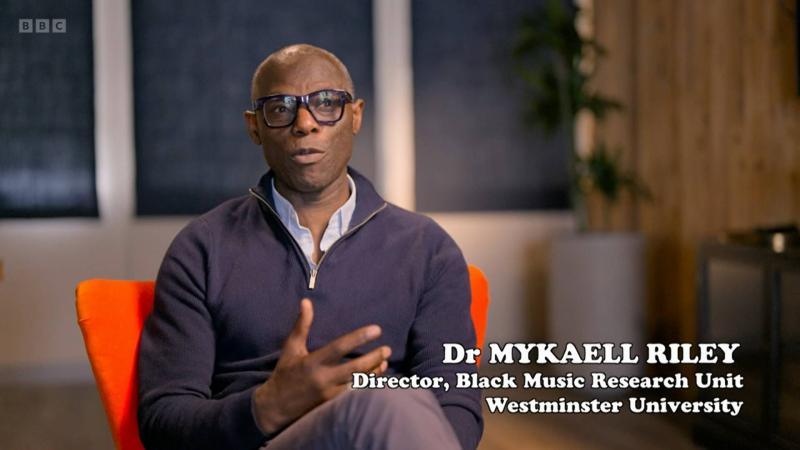Mykaell Riley, Senior Lecturer and Director of the Black Music Research Unit (BMRU) at the University, has been interviewed for a two-part BBC Two documentary called ‘Lenny Henry’s Caribbean Britain’ which examines what it means to be both Caribbean and British today.

The first episode of the two-part documentary, which aired on 22 June 2022, is presented by comedian, actor and writer Lenny Henry CBE and examines the contributions of British people of Caribbean heritage to art, poetry, TV, theatre and music, and also discusses what ‘integration’ meant for Caribbean immigrants and their culture in British society.
It featured contributions from several influential figures of Caribbean heritage including Baroness Floella Benjamin, Judi Love, Billy Ocean, Benjamin Zephaniah, Trevor Nelson, Levi Roots and Andi Oliver.
Mykaell Riley spoke about several topics in the first episode such as the influence of Caribbean music, the challenges faced by Caribbean immigrants who had recently arrived in Britain, and the mixed emotions that came with seeing Caribbean characters represented on British television for the first time.
Speaking about the history of Caribbean music in Britain, Riley said: “I think when we look at the history of black music whether it’s hip-hop, grime, poetry, spoken-word… there’s a direct relationship between the artist and the audience. It’s conversational. “We can connect that social commentary, all delivered with a sense of humour, right back all the way to Calypso.”
On the subject of integration in the post-war era, and the challenges this brought for Caribbean immigrants and their children, Riley said: “Sections of the British community thought the black community were sub-human. The idea that you might have gone to university, that you were skilled in various job sets, the idea that you spoke with a British accent was all new. So, we were aliens as far as [the white British population] were concerned, that had no place in Britain. And that meant, for the black community, we were at risk.”
In the second episode, on 19 July 2022, Lenny Henry looked back on his coming of age and explores how he and other second and third-generation British-born Caribbean children began to mesh their identity into their art from the 1980s onwards.
Speaking about the impact of ska and how it was embraced by white audiences, Mykaell said: “The success of reggae and punk meant that we had bands like Madness, The Specials, The Beat, Selecta – all mixed bands using ska to make popular music… Is the basis of popular music in the UK.”
The documentary notes that Caribbean music being embraced by white audiences did not come without its challenges for black artists, who saw awards and recognition handed to their white peers who were heavily influenced by their sounds. Riley explained: “Many of the opportunities we were hoping for had been fulfilled but not by us, but by our white counterparts so it’s a challenging period because we want that embrace of what we’re doing, but we also want to be central to that success, and often we were not.”
Watch both episodes of Lenny Henry’s Caribbean Britain on BBC iPlayer.
Find out more about the work of the Black Music Research Unit.


